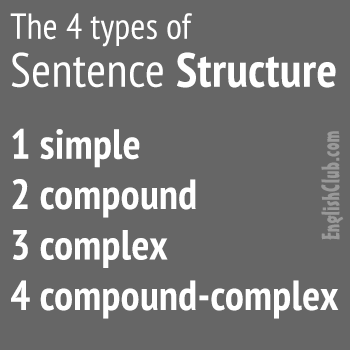In What is a Sentence? we saw the minimum requirements for the formation of a sentence. Now we can look in more detail at the four types of sentence structure.

Simple Sentence Structure
A simple sentence consists of one independent clause. (An independent clause contains a subject and verb and expresses a complete thought.)

- I like coffee.
- Mary likes tea.
- The earth goes round the sun.
- Mary did not go to the party.
Compound Sentence Structure
A compound sentence is two (or more) independent clauses joined by a conjunction or semi-colon. Each of these clauses could form a sentence alone.



- I like coffee and Mary likes tea.
- Mary went to work but John went to the party.
- Our car broke down; we came last.
There are seven coordinating conjunctions:
- and, but, or, nor, for, yet, so
Complex Sentence Structure
A complex sentence consists of an independent clause plus a dependent clause. (A dependent clause starts with a subordinating conjunction or a relative pronoun, and contains a subject and verb, but does not express a complete thought.)


- We missed our plane because we were late.
- Our dog barks when she hears a noise.
- He left in a hurry after he got a phone call.
- Do you know the man who is talking to Mary?
Here are some common subordinating conjunctions:
- after, although, as, because, before, how, if, once, since, than, that, though, till, until, when, where, whether, while
Here are the five basic relative pronouns:
- that, which, who, whom, whose
Compound-Complex Sentence Structure
A compound-complex sentence consists of at least two independent clauses and one or more dependent clauses.




- John didn't come because he was ill so Mary was not happy.
- He left in a hurry after he got a phone call but he came back five minutes later.
A dependent clause is also called a subordinate clause.
The above sentences are basic examples only. In some cases other arrangements are possible (for example, a dependent clause can come before an independent clause).
https://www.englishclub.com/grammar/sentence/sentence-structure.htm
https://www.englishclub.com/grammar/sentence/sentence-structure.htm
Tidak ada komentar:
Posting Komentar